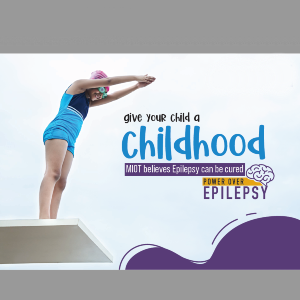Epilepsy Clinic
Epilepsy is a chronic disorder of the brain in which there is a greater chance of getting seizures / fits repeatedly. Seizure is due to abnormal electrical discharges from the brain. It presents as a brief period of disturbance of sensation (taste, vision, and smell), mood, abnormal movement of one part or whole of the body with or without loss of consciousness and control of bowel and bladder function.
Meet our team of Epilepsy specialists comprising of Epilepsy Disorder specialists, Epilepsy surgeons, Neuro-Psychologist and Neuro-Physiotherapist who will find the right course of treatment for your child and help manage epilepsy over time – so your child can be a child again.
For Appointments : Call +91 93840 83062 or register online in the below form
Book Appointment:
It can affect any age group, but children affected with epilepsy have a very huge impact on their life. A child can be epileptic from birth due to Congenital malformations of the brain, decreased blood circulation or oxygen supply to the brain at the time of birth or at any age due to trauma to the head, genetic causes, infections of the brain, tumours of the brain and metabolic abnormalities of the brain.
Those affected from birth have developmental delays, that is, they do not reach their milestones in the expected age. Eg: An epileptic infant may not crawl at 6 months or walk at 1yr of age. The delay will vary based on the brain damage. Many children also suffer from sensory impairment, partial or complete loss of vision, hearing, speech, cognitive impairment, etc. As a result they may not be able to do most of the activities like any other normal kid and may even miss out of school.
Such children are not allowed to do many things that make up a complete, well-rounded childhood. They can’t do the rough and tumble things that kids normally do. For example climbing trees, playing physically heavy sports, going for outdoor excursions. The result is that children feel a bit left behind and are also isolated from children of their own age group. This causes a huge impact on their mental well-being.
Parents whose children have epilepsy know the drill. Just say no to anything physical or any experience that might trigger an attack. We know that it should be the exact opposite. Parents should say “Yes, you can” to their children for everything that makes their childhood normal – sports, swimming, outdoors, cinema.
Don’t hold them back. Set them free from epilepsy.
Yes, epilepsy can be cured.
You heard it right. MIOT has the Expertise and Infrastructure to manage and even cure epilepsy. Dedicated team of Epilepsy Disorder specialist, Epilepsy Surgeons, Neuro-radiologists, Nuclear Medicine experts, Neuro-technician; Neuro-intensivist help find the right treatment for your child as per his or her condition and help manage it over time. So your child can be a child again.
But before we get there, let’s understand the condition
Epilepsy is a chronic disorder of the brain in which there is a greater chance of getting seizures/fits repeatedly. We call a patient to be having epilepsy if he or she develops more than 2 seizures/fits occurring atleast 24 hours apart and without any obvious provocation.
It can affect people of any age group. A child can be epileptic from birth due to Congenital malformations of the brain, decreased blood circulation or oxygen supply to the brain at the time of birth or at any age due to trauma to the head, genetic causes, infections of the brain, tumours of the brain and metabolic abnormalities of the brain.
The right diagnosis leads to right treatment
Every patient’s condition is unique. A proper detailed history from the family of a patient with seizure gives the most reliable information in clinically arriving at a diagnosis. Video of the seizure episode taken also helps the doctor to find out the type of seizure.
Our team uses a whole array of state-of-the-art technology to arrive at a correct understanding of every patient’s condition. We use one or a combination of processes to arrive at a diagnosis.
Sleep or awake EEG to detect the abnormal electrical discharges and from which part of the brain is it arising. Depending on the frequency and severity of seizures, Video EEG (VEEG) is needed.
3 Tesla MRI where scans are done on thin slices of certain parts of brain to show up any lesion causing the epilepsy
FDG-PET / SPECT scans are also used to locate the exact area in the brain from where the abnormal electrical discharges arise
Subdural grid/Stereotactic EEG placement is a process where there is surgical implantation of thin wires into the brain to identify the location from where seizures arise. It’s a unique technique used by the MIOT team which requires skill and high level of proficiency.
Every case is discussed in the Neuro Board comprising of team of specialists and a comprehensive treatment plan is charted out for each patient.
Team: Dedicated team of Neurologists, Neurosurgeons, Neuro-radiologists, Nuclear Medicine experts, Neuro-technician; Neuro-intensivist supported by Neuro-Physiologists, Neuro-Psychologist, Speech & Swallow therapist, Occupational therapist and Nutritionist.
Medical Management: The right medicines in the right dosages managed over time can make 70% of the patients seizure-free. For more severe cases called Refractory Epilepsy dosages are strengthened.
Vagal Nerve Stimulation (VNS): The Vagus nerve arises from the brain and travels through the neck and to provide electrical regulation to the various organs in the body. By providing a small pacemaker implanted into the chest, external stimulation is given to this nerve in the neck and that is known to reduce abnormal electrical activity of the brain. In children and young adults, where the focus of seizures cannot be determined and the seizures are too debilitating, then VNS can be a good option.
Surgery: Surgery can come into play if medicines do not have the desired effect in certain cases. Surgery can help in both identifying the focus of seizures as well in control of the abnormal area.
- Lesionectomy - This involves removal of the culprit zone responsible for seizures
- Disconnection surgery - The abnormal zone is disconnected from the surrounding normal brain so that the seizure activity does not spread
The outcomes of epilepsy surgery vary depending on the type of surgery performed. The expected outcome is seizure control with medication. If you remain seizure-free for at least one year, your doctor may consider discontinuing your anti-seizure medication and eventually taking you off of the drugs entirely.
Comprehensive Rehab care: Neurorehabilitation plays a crucial role in management ofpatients with Epilepsy. Epilepsy is known to impact not only the physical health of theindividual, but also on the psychological, cognitive, behavioural and socio-economicdomains. MIOT Rehab Centre is manned by a team of clinicians, Neuro-Physiotherapist,Neuro- Psychologist, Speech & Swallow therapist, Occupational therapist and Nutritionist toprovide a holistic rehab to patients with Epilepsy.
- Experienced and dedicated team of Epilepsy Disorder specialist, Epilepsy Surgeons, Neuro-radiologists, Nuclear Medicine experts, Neuro-technician; Neuro-intensivist with more than 30yrs of experience
- One of its kind Neuro board comprising of a multidisciplinary team of specialist to discuss every case and chart out a comprehensive treatment plan
- State-of-the-art Infrastructure: 3T MRI, advanced EEG lab, PET CT – All under 1 roof Modular operating theatres with laminar airflow system that reduces the chances of infection to less than 0.02%
- MIOT Rehab Centre – 1 st of its kind in South India to cater to not only the physical well-being of a patient but also mental wellbeing.
Ketogenic Diet Basics
The Ketogenic Diet is a treatment option for people with epilepsy – typically for those whose seizures are not controlled with anticonvulsant medications. It is used more commonly in children than adults owing to greater ability to manage diet restrictions in children.
What is ketogenic diet?
The typical ketogenic diet provides 3 to 4 gram of fat for every 1 gram of carbohydrate and proteins.A ketogenic diet ratio is the ratio of fat to carbohydrate and protein grams combined. The kind of food that provide fat are butter, heavy whipping cream, mayonnaise and oils. A dietitian has to prepare the diet and should carefully monitor the child’s nutrition.
How does the diet work?
Usually body uses carbohydrates( sugar, rice, wheat, bread) for its fuel, but fats become the main source of energy in ketogenic diet.
How to start the diet?
Typically the diet is started in the hospital. This is to monitor for any increase in seizure while on the diet , treat hypoglycemia and acidosis ( which can happen during the dietary intake), monitor and enhance tolerability, ensure all medications are carbohydrate-free and educate parents how to maintain the diet at home.
Who is the suitable candidate?
It is recommended for those patients whose seizure are not responded to multiple anti-seizure medicines. In children, it is particularly recommended for Lennox-Gastaut syndrome, Myoclonic –astatic epilepsy, Dravet syndrome, West syndrome, GLUT-1 deficiency syndrome, pyruvate dehydrogenase deficiency and those with tuberous sclerosis complex.
Does the diet work?
In half of patients who go on for the diet, at least 50% reduction in the number of seizures, 10-15% become seizure-free. But not all children had better seizure control, but have some benefits like increased alertness , awareness and responsiveness.
How is diet monitored?
Urine analysis stick is used to monitor production of ketones in the diet. In addition, every 3 months other tests are done to monitor electrolytes, kidney function, liver function, carnitine, selenium and more.
Are there any side-effects?
Initially patient may feel sluggish for a few days, other side-effects that might occur include kidney stones, high cholesterol level in the blood, vomiting, constipation etc.
How is the patient monitored?
Regular follow-up are usually every 1-3 months to monitor the growth ( height and weight), adjustment of anti-seizure medicines, monitor seizure history. Blood and urine tests are done to make sure there are no complications.
The need for other supplements?
Since the diet dies not provide vitamins and minerals found in a balanced diet, dietitian will recommend vitamins and mineral supplements like calcium, vitamin D, selenium, iron, folic acid and other B vitamins. Many centres treat children with citrates to prevent kidney stones and L carnitine.





